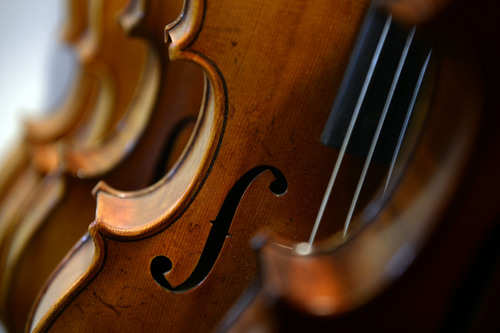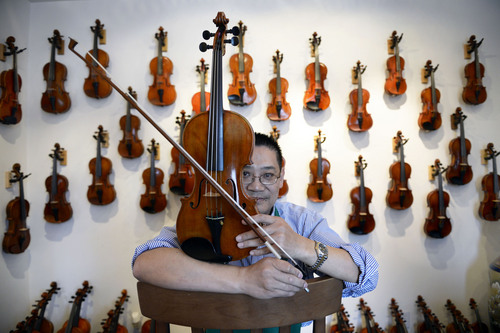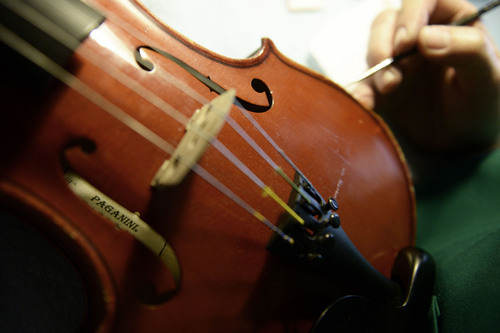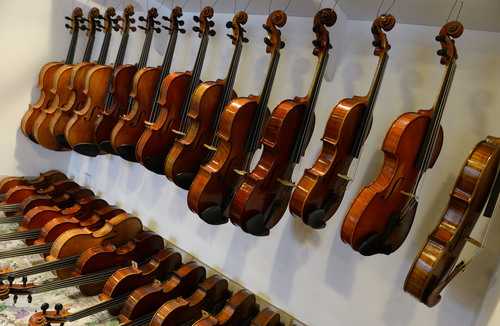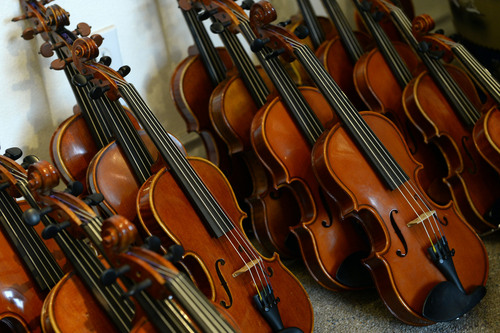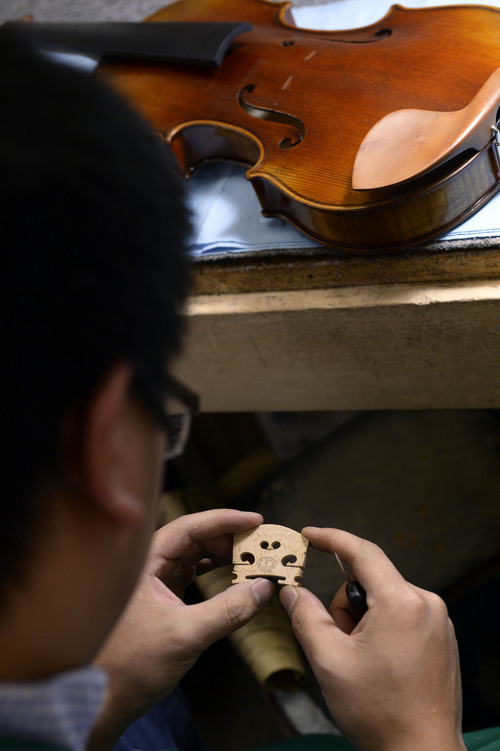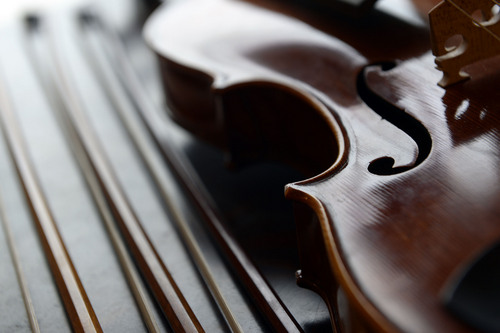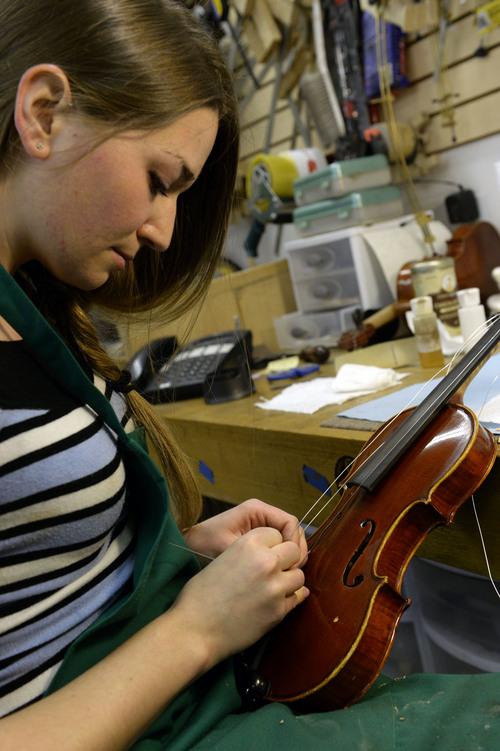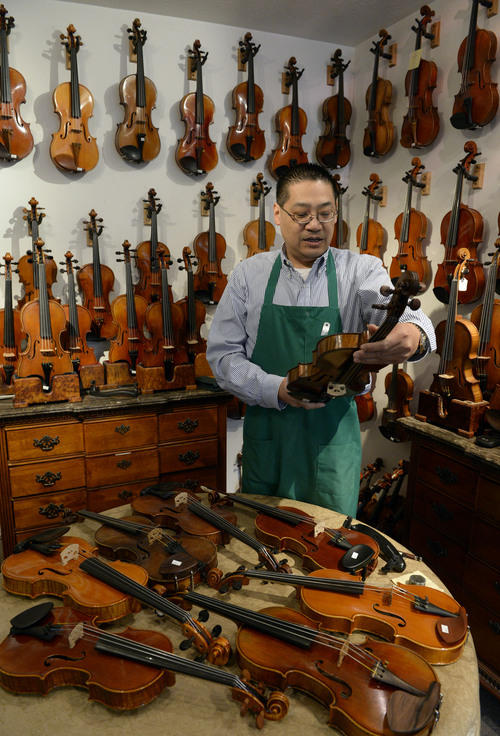This is an archived article that was published on sltrib.com in 2014, and information in the article may be outdated. It is provided only for personal research purposes and may not be reprinted.
Midvale • Violin maker Charles Liu's philosophy of business and life can easily be summed up with two of his quotations:
"If you find a career you love, it will make you happy the rest of your life. I enjoy everything. I talk to customers, work on restoring old instruments and, when I have time, enjoy making new instruments. I enjoy working with fine musicians on competitions."
And:
"If you benefit from a community, you need to pay back to the community. If you take money and walk away, no one will care about you."
Dozens of string instruments fill nearly every room of Liu's shop, Charles W. Liu Fine Violins at 7450 S. State in Midvale. In the back workshop, some of his five employees work to restore, make or repair violins.
Liu's journey as a violin store owner and craftsman began when he was 9 years old in China. He began playing the instrument, beginning a life-long love affair with it. Alas, when he asked his instructor if he had the talent to be a professional musician, the teacher looked at him and said "not a chance."
At the age of 16 in 1983, Liu began making violins in China. The industry was just developing at that time, but the factory where he worked won China's first prize in a German international contest for quality.
Liu decided that if he couldn't play professionally, he would learn how to make the instruments. He graduated from a school in China, but he wanted to learn more. The best violin making schools were in Italy and Germany. Liu didn't speak either language, but he did know some basic English, a skill he expanded by working for a Holiday Inn in Beijing frequented by Americans.
He researched violin-making schools in the U.S., finding one in Boston and another in Salt Lake City, the one offered by Peter Paul Prier. In 1991, he began applying for a spot at violin-making school. After sending Prier a violin, he was accepted. After three difficult years, Liu finally earned a visa to the U.S. He finished Prier's four-year program in 2½ years.
After working for Prier and Riverton and Summerhays music, Liu returned to China, and, with his mother's help, invested in a wholesale violin factory in China. He returned to Utah in 2002 and opened his first retail shop in Midvale. He also became a U.S. citizen that year.
He built the business by renting or selling high-quality instruments at his cost to music students throughout the Salt Lake Valley as well as doing repair work.
One of the reasons he picked Utah as a place to live was that most of the state's schools offer music lessons, many as early as fourth grade. In California, for example, Liu discovered that not all the schools offer music.
Liu's business plan is to rent high-quality beginner instruments at near cost and then allow students or professionals to trade up when they get more serious about music. He gives customers 100 percent trade in on instruments purchased or rented, minus a $39 fee for violins and violas and $75 for cellos. Student violins go up to $1,000, violas go up to $1,500 and cellos go up to $2,500.
Becky Benham of Salt Lake City said her daughter traded up as she advanced in her musical career.
"They are great," she said of working with Liu. "It's been a good experience. We've bought two violins here."
He also came up with the idea of sponsoring the Stradivarius International Violin Competition in 2007. It brings some of the top student violinists from all over the world to compete in Utah every three years. First prize for the college level senior is $10,000 and a solo appearance with the Utah Symphony. Junior competitors compete for a $5,000 to $7,000 prize.
Liu proudly displays letters of support for the competition from then President George W. Bush and former Utah governor Jon Hunstman.
The original winner, Yoonshin Song, is currently the concert master at the Detroit Symphony.
Liu still finds time to make custom violins, which start at $15,000. He also restores valuable antique stringed instruments, some worth six figures.
"I still play, but I don't have much time," said Liu. "My only practice time is when I show the instruments to my customers. I have no time to play in a community symphony, but I would love to as I get older."
He said the reason for opening a second shop in Los Angeles is to cater to a new market where the demand for higher-end, more expensive instruments may be greater than in Salt Lake City.
Mostly, though, Liu looks like a man totally in tune with life, with the instruments he builds, restores and sells, and the many customers he serves.
Twitter: @tribtomwharton


